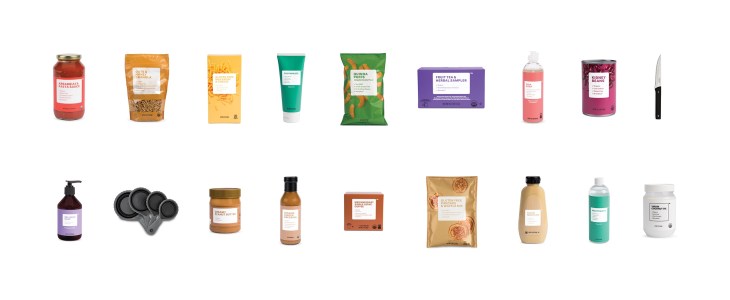Brandless, a direct-to-consumer purveyor of food, beauty, and personal care products, says that every item it makes is non-genetically modified, kosher, fair-trade, gluten-free, often organic and, in the case of cleaning supplies, EPA “Safer Choice” certified. Beginning with its 2017 product launch, items were also priced at $3 across the board.
That changed in January, when the company added baby and pet products to its stable of offerings, some of them at a $9 price point. But according to a new report in The Information, that’s far from the only change afoot at the company. Instead, the outlet paints a picture of a company that sold 40 percent of its business to SoftBank for a stunning $240 million before it had found its footing, and where things have been sliding downhill since.
Indeed, while cofounder and longtime CEO Tina Sharkey suggested to Bloomberg that SoftBank loved Brandless’s uniform price points, its messaging to customers, and that Brandless was focused on a “highly curated collection” in contrast to Amazon’s everything-store ethos, Brandless has steadily been losing customers since the round closed — a lot of them, according to The Information.
Specifically, it says that analysis provided to it by Second Measure, a company that analyzes anonymized debit and credit card purchases, found that Brandless had 26.5% fewer customers last month than it did in May 2018.
The Information says it has talked with numerous former employees who cite quality control issues as one of the company’s biggest challenges over time — from silicone serving spoons that detached from their handles, to glass containers that arrived broken on customer’s doorsteps and, in some cases, sliced their fingers.
They also recount inventory challenges, including buying too much perishable inventory and not buying enough of other, popular items. And they say that some of the inventory for sale on Brandless in its early days came from Beach House, a company that was cofounded by Ido Leffler, an Israeli entrepreneur who also cofounded Brandless with Sharkey.
SoftBank declined to comment, but Brandless sent us a statement, reading: “Brandless remains focused on making high-quality products for our community. The company is well-capitalized to continue innovating across multiple wellness verticals and accelerate our distribution into new channels.”
A bigger revelation by The Information is that Sharkey stepped down as CEO in March, which Sharkey had herself quietly revealed in a Medium post at the time titled “More Goodness.”
A source familiar with the situation says Sharkey made the decision, approaching the board about replacing herself and moving exclusively into a co-chairman role. The Information cites its own source, who seems to echo that Sharkey was not elbowed aside, but who suggests her decision stemmed from tensions with SoftBank, which was pushing for Brandless to turn a profit.
The Information also reports that Brandless recently appointed a new CEO to replace Sharkey: serial founder John Rittenhouse, whose LinkedIn profile says he began the job last month. Rittenhouse spent several years as a C-suite executive at Wal-Mart nearly 20 years ago. He has since cofounded two beverage industry companies, VinAsset and the business-to-business software firm Fortera.co.
A source tells us he was introduced to the company through New Enterprise Associates, which is one of numerous other early investors, including Redpoint Ventures, GV, and Cowboy Ventures, that have given Brandless $292 million altogether, according to Crunchbase.
Asked about the Rittenhouse this morning, a Brandless spokesperson simply confirmed his role and cited his work history, writing us that, “In May, Brandless welcomed John Rittenhouse as chief executive officer and a member of the Board. John has decades of e-commerce and retail experience from senior leadership roles at Walmart, Target, LVMH and Moda Operandi, and a deep understanding of the complexities of operating a CPG business.”
The Information report is definitely worth a read, offering as it does other interesting details while leaving open the question of whether Brandless is going through the growing pains of a young company that raised too much capital too soon, or its problems run deeper.
Either way, the bet is looking like a troubled one right now for SoftBank, and at a time when the Japanese conglomerate reportedly has other, seemingly major challenges with which to contend.
